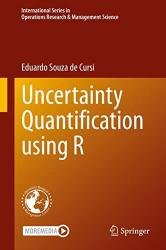Uncertainty Quantification using R
- Добавил: literator
- Дата: 24-02-2023, 17:06
- Комментариев: 0
 Название: Uncertainty Quantification using R
Название: Uncertainty Quantification using RАвтор: Eduardo Souza de Cursi
Издательство: Springer
Год: 2023
Страниц: 767
Язык: английский
Формат: pdf
Размер: 33.9 MB
This book is a rigorous but practical presentation of the techniques of uncertainty quantification, with applications in R and Python. This volume includes mathematical arguments at the level necessary to make the presentation rigorous and the assumptions clearly established, while maintaining a focus on practical applications of uncertainty quantification methods. Practical aspects of applied probability are also discussed, making the content accessible to students. The introduction of R and Python allows the reader to solve more complex problems involving a more significant number of variables. Users will be able to use examples laid out in the text to solve medium-sized problems.
The list of topics covered in this volume includes linear and nonlinear programming, Lagrange multipliers (for sensitivity), multi-objective optimization, game theory, as well as linear algebraic equations, and probability and statistics. Blending theoretical rigor and practical applications, this volume will be of interest to professionals, researchers, graduate and undergraduate students interested in the use of uncertainty quantification techniques within the framework of operations research and mathematical programming, for applications in management and planning.
The methods of UQ are general and may be applied to a wide range of situations. They generally belong to the large and well-supplied family of methods based on functional representations, id est, on expansions of the unknowns in series of functions – we find these approaches in particular in Fourier analysis, spectral methods, finite elements, Bayesian optimization, quantum algorithms, etc. It is a large family with numerous and very diversified applications.
Our objective is to present the practical use of UQ techniques under R. We assume that you are a mean user of this kind of software: if you are a user of Scilab, Octave, or Matlab, you will recognize the instructions and the codes presented will appear as familiar. Evidently, if you are an expert in R, you will find a large number of improvements in our codes and programs: do not hesitate in making your own enhancements and, eventually, in sharing them.
R is a GNU project to develop a tool for language and environment for statistical computing and graphics. An IDE is proposed by RStudio. The popularity of R and RStudio is no more to be demonstrated: you will find on the web many sites and information about R. A wide literature can be found about this software. The community of the users of R proposes a wide choice of packages to extend the possibilities of R.
R programming is analogous to programming in usual programming languages and interpreters. Classes in R: Classes can be useful to define objects that are destined to be replicated, for which we desire to manipulate different copies simultaneously. R furnishes different methods for the creation of classes, and you can find packages furnishing supplementary methods. Here, we examine one of these methods, which is close to the usual methods of creation of objects in other languages, based on the package R6. You can install the package R6 from the R repositories on Internet. R6 classes follow the standard model of objected oriented programming: they contain public properties and methods, and private properties and methods. Public elements may be accessed by external elements, while private elements are accessible only internally.
Скачать Uncertainty Quantification using R
Внимание
Уважаемый посетитель, Вы зашли на сайт как незарегистрированный пользователь.
Мы рекомендуем Вам зарегистрироваться либо войти на сайт под своим именем.
Уважаемый посетитель, Вы зашли на сайт как незарегистрированный пользователь.
Мы рекомендуем Вам зарегистрироваться либо войти на сайт под своим именем.
Информация
Посетители, находящиеся в группе Гости, не могут оставлять комментарии к данной публикации.
Посетители, находящиеся в группе Гости, не могут оставлять комментарии к данной публикации.
